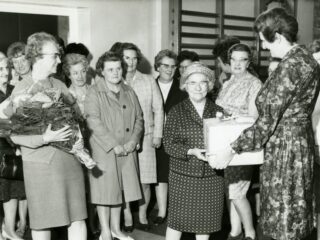“May” is an interesting word. The word means we have the opportunity to do something, the required authority to act. The word, however, doesn’t mean we’re actually going to do anything. We can. We might. We could. We should.
But we don’t.
Most of us know we need to lose weight. The process isn’t that complicated. Don’t eat as much. Cut down on refined foods and sugar and get a little exercise. We don’t have to join an expensive gym. All we have to do is walk through our neighborhood. It’s not that hard. Everyone knows this.
But we don’t do it.
All of us know what is required to have a deeper relationship with Christ. Find a quiet place to sit down. Read our Bibles and pray. Be faithful to the teachings of Jesus. We don’t have to be heroic in our faith, just be average in our response to what Christ would require of us.
But we don’t.
Every one of us knows three things that would improve our relationships — with our spouses, our children, our neighbors, and friends — but we don’t do them.
Why?
There are all kinds of reasons. Sometimes, we’re just lazy. Sitting in the recliner is always easier than walking around the block. Watching television is always easier than reading a book.
Sometimes, however, I think there’s another reason. We’re not sure who’s in charge.
Let me tell you what I mean. We have become so fascinated with experts we don’t think we have the ability to solve the simplest problems. Whatever challenge we might face, there’s an expert on that subject with several books and YouTube videos on the topic. Obviously, we can’t take any action until we have thoroughly researched the subject.
And who has time to do that?
But think about it. Who knows us better than us? Here’s the refreshing truth — the expert in us is us.
In 2 Corinthians, Paul reminds us that all of God’s promises are “yes” in Christ. That is, everything we would ask, want, desire, or need has been given to us in Christ. We not only have the permission we need to live our lives well, but we also have the authority — from Christ Himself– to live our lives well. All we have to do is change one word in our conversations. We have to exchange “may” to “will.”
“Will” is a very different word from “may.” While “may” means we can take action, “will” means we are taking action. Will means we are getting up out of the recliner and taking a walk around the block. Will means we’re finding our Bible (it’s around here someplace), and we’re going to begin to read. Sure, there will be parts of the Bible we don’t get, but there will be a lot more we do get.
We’ll start. We’ll begin. We’ll act. We will.
For much of our lives, we had to get someone else’s permission to take action. Our parents, our teachers, our bosses are just a few of the people who’ve had a say in our lives. Now, most of us are to the point where we don’t have to ask anyone else’s permission to do what we want to do.
Did you get that? We already have permission. So, now that we can, what will we do?
Will we write the novel that’s been in our head for the last few years? Will we start a new business? Will we run for local public office?
Will we plan a romantic getaway for our spouse? Will we surprise our children with an interesting family project? Like building a treehouse for our grandchildren or tracing our ancestors back to our families’ beginnings?
God has created a world begging to be explored. He’s created millions of people who are longing to be known. There are thousands of words that want to be arranged into beautiful poetry. There are countless children hungry to be taught. Great mysteries waiting to be known. Stacks of books to be read, problems to be solved — in short, there’s a lot of life to be lived.
And we don’t need permission to live it. We already have that. What we need to do now is change our conversation and thinking from “may” to “will.”
May is an interesting month to consider what we might get done if we’re only willing to do it.









